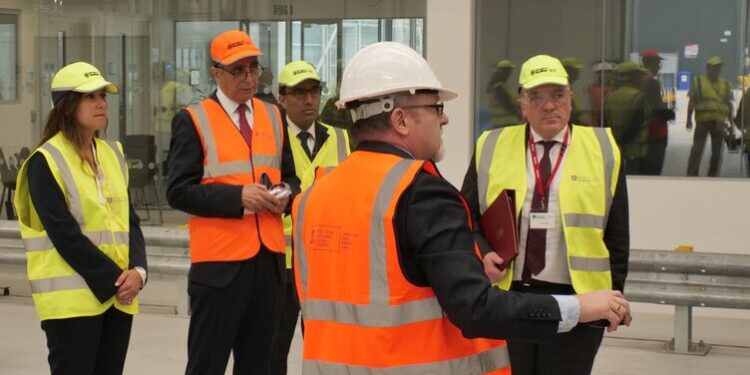The University of Sheffield has secured significant UK government support to help revolutionise how sustainable aviation fuel (SAF) is produced, bringing the aviation sector one step closer to achieving net-zero emissions.
On Monday 21 July, Aviation Minister Mike Kane MP visited the university to announce the funding. Sheffield will lead a £1.5 million initiative aimed at commercialising its novel SAF technology and encouraging investment in future production facilities to boost the availability of the cleaner fuel.
The scheme, known as NextGen-SAF, brings together a partnership of international and UK-based organisations, including Fuel Cell Energy (USA), Green Lizard Technologies (UK), Drax Power (UK), IMI Vivo (Italy), Gardner Consulting (UK), and Leeds Bradford Airport (UK). The project has also garnered backing from major players such as Airbus, Boeing, Qatar Airways, and the City of Doncaster Council.
While SAF is often made from organic or waste materials, concerns remain over whether those resources can be scaled to meet demand. The University of Sheffield’s new method bypasses these limitations by using renewable energy in tandem with advanced carbon capture systems to create fuel.
This innovative approach, known as Power to Liquid (PtL), involves producing hydrogen through renewable electricity and capturing carbon dioxide from industrial sources or the atmosphere. These are combined to form synthetic hydrocarbons, which are then refined into usable aviation fuel.
Not only could this technique make SAF more cost-effective, but it also allows greater flexibility and the potential to cut emissions across industrial sectors.
NextGen-SAF will create a pioneering demonstration plant that integrates two core technologies: a Molten Carbonate Fuel Cell (MCFC) and an Advanced Fischer-Tropsch (AFT) reactor. Together, these systems will generate hydrogen, capture CO2, and synthesise hydrocarbons, offering a fully integrated route to SAF production. The goal is to prove the system’s efficiency, stability, and scalability.
“We are proud to lead this project, made possible by this vital funding, to develop a new and innovative SAF production pathway. Sustainable Aviation Fuel is essential to reducing emissions from the aviation industry, and through this project we are taking a major step toward scaling up SAF production right here in the UK. This initiative not only advances the UK’s goals around SAF but also strengthens the nation’s fuel production capabilities and will deliver lasting economic benefits.”
Professor Koen Lamberts, President and Vice-Chancellor of the University of Sheffield.
The Sheffield project is one of 17 receiving a share of £63 million in government funding to speed up SAF development.
“This £63 million is lift-off for Britain’s green aviation revolution. We’re not just backing brilliant British innovation; we’re creating thousands of high-skilled jobs and positioning the UK at the forefront of the global sustainable aviation market.
From the labs of Sheffield to the runways of the future – this is how we kickstart economic growth, secure energy independence, and make Britain a clean energy superpower.”
Mike Kane, Aviation Minister.
Sheffield has earned a global reputation for its SAF research, hosting some of Europe’s top clean energy facilities at its Energy Innovation Centre. These include pilot-scale systems designed to support industry and academic partnerships in trialling cutting-edge low-carbon technologies.
The University is also home to the UK SAF Clearing House, one of only two such centres worldwide, which helps fuel developers meet the strict certification standards required for aviation use.
Sheffield’s expertise was also instrumental in the world’s first transatlantic flight powered by SAF, during which its researchers measured the impact of the fuel on emissions and contrail formation. Their analysis revealed emission cuts of up to 70 per cent.
“It is fantastic to see the University of Sheffield playing a leading role in the development of sustainable aviation fuel and supporting the aviation industry in its efforts to reduce its emissions. At Sheffield we have some of the most advanced SAF research facilities in Europe and are excited to work with partners from the industry to help them test and develop new fuels and next generation clean energy technologies.”
Professor Mohamed Pourkashanian, Managing Director of the University’s Energy Innovation Centre and the project lead.
Interested in connecting with aviation suppliers driving the future of sustainable flight? Get in touch to find out more about our MTB Aviation events.

































